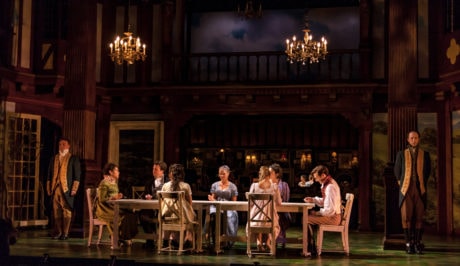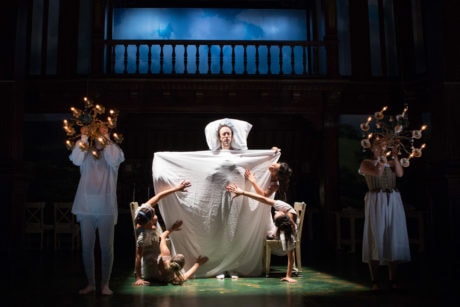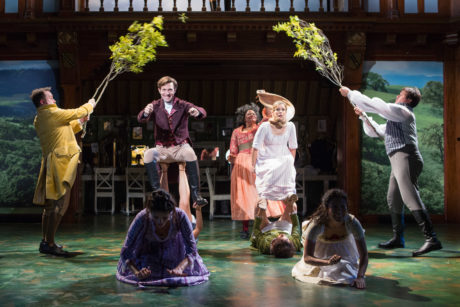Hey Girl, I Hear You Read Jane Austen; Sense and Sensibility at the Folger Theatre
The appeal of Jane Austen’s heroines lies in their lovability. In Sense and Sensibility, the two sisters, Elinor and Marianne, are especially attractive, in part because they are surrounded by insensitive family and friends. Austen’s wry wit makes every moment of the story layered with meaning, and contributes to the depth of the experience.

Erin Weaver as Marianne and Maggie McDowell as Elinor in Folger Theatre’s Sense and Sensibility capture the spirit of these two lively girls beautifully. They are at the heart of Director Eric Tucker’s madcap production, which combines the sublime chaos of the Marx Brothers with the exquisitely subtle dialogue of the inimitable Jane. The theme of self-control versus passionate feeling resonates today as it always has.
The world premiere of Sense and Sensibility was produced off-Broadway by Bedlam (Eric Tucker, Artistic Director), was voted “Top Ten Theater of 2014” by The New York Times and the Huffington Post, and has been extended three times since then.
Kate Hamill’s acclaimed adaptation retains the most important scenes, and moves with lightning speed. The actors dance, carry trees, beds, and other set items, play several characters of different sexes, and sometimes even horses or dogs. Chairs and windows whiz around the stage. Elinor’s love Edward Ferrars (Jamie Smithson) recites Hamlet, under the direction of Marianne. All of the actors engage with the audience, and the superb Caroline Stefanie Clay, as the voluble but slightly (make that extremely) vulgar Mrs. Jennings, gives the front row a friendly “Hello.” It reminds me of some truly superlative Austen memes; a picture of Colin Firth, for example, entitled, “Hey girl, I love that you have improved your mind through extensive reading.”
One of the notable successes of this highly-charged staging is that we are drawn into a world where a married woman cannot make contracts or own property; a “young lady” cannot go out alone with a man; writing letters to one another signifies an engagement; and poverty is the greatest social gaffe of all. Although at first it is a bit jarring to see Austen performed in such a circus-like atmosphere, the underlying emotion actually fits in perfectly with one of the leitmotifs of Austen’s work; desperation.
The Dashwood sisters were in a terrible position at the start of the play; they were poor, and girls had few options besides the marriage market. Economic considerations were very important in marriage, and divorce meant disgrace for a woman. So the stakes for eligible females were extremely high. Combine that with the ability they had to evaluate a suitor (very limited); the constant gossip and competition, and the sense that time was running out, and it is a miracle that more of them didn’t run mad, or marry the first man who said to them (another meme, this time with a picture of Ryan Gosling), “Hey girl, I’m a single man in possession of a good fortune.” Lives were much shorter then, and age was treated very differently. In one of the most famous lines in the book, Marianne opines that “A woman of seven and twenty…can never hope to feel or inspire affection again.” Here, the age is changed from 27 to 30. But the essential facts ring true. In Austen’s time, it seems, women had slightly more shelf life than Olympic gymnasts.
Edward Ferrars, in this adaptation, is a bit of a buffoon. Jamie Smithson’s sure comic touch keeps him interesting, and his love affair with Elinor is an extreme example of the adage that opposites attract. Smithson’s turn as younger brother Robert sparkles with inspired lunacy.

Jacob Fishel creates two utterly dissimilar characters in the handsome Willoughby and the mercenary John Dashwood. As Willoughby, he enters with a dig-how-awesome-I-am smile. But he is equally effective in his final serious scene with Elinor. As John Dashwood, he is entertainingly unctuous and self-interested.
Lisa Birnbaum as Mrs. Dashwood and, alternatively, Anne Steele, displays a Lucille-Ball like charm and comic inventiveness. Michael Glenn as Sir John Middleton has a wickedly absentminded smile, reminiscent of the British actor Brian Blessed as Augustus in I Claudius grinning cheerfully as he orders executions. Nicole Kang as younger sister Margaret has her own outrageous appeal; she is like no Jane Austen character I have ever seen, but her take on the character is uniquely droll. James Patrick Nelson as the “old” Colonel Brandon (he is 35 at the beginning) has a deep voice and unmistakable sincerity; he earns more of our sympathy as we learn more about him.
Kathryn Tkel has the unenviable task of playing the two most unpleasant women in the group; Fanny Dashwood and Lucy Steele. She has the tone of these calculating characters down flat; she smiles as she devastates Elinor, as vividly as the Cheshire cat, only she doesn’t disappear. She enjoys every minute of it.
Alexandra Beller’s choreography switches from Regency to today in the blink of an eye. There are many creative directorial touches, and while some seem a bit too contemporary (Edward lasciviously dipping his pen in ink as he stares at Elinor, for example) the fluidity, energy and attack of the production are exceptional.

Sound design by James Bigbee Garver has a dizzying variety of styles, enhancing the anything-goes atmosphere. Lighting Design by Jesse Belsky is strikingly imaginative; there are actually strobe lights; and costumes by Mariah Hale are, as always, eye-catching and revealing of character. Scenic Design by John McDermott is simply spectacular; the stage becomes almost like a carousel, and the actors fly around it with breathless abandon.
Austen purists might find the flamboyance of this Sense and Sensibility a bit difficult to take. The subtlety of Austen’s writing is sometimes overwhelmed by the broadness of the comedy. But Austen, like Shakespeare, was not just of an age but for all time. This is an opportunity to appreciate again just how timeless she is.
Sense and Sensibility is presented in concert with the Folger Shakespeare Library’s exhibition Will & Jane: Shakespeare, Austen, and the Cult of Celebrity, currently on display at the Folger’s Great Hall through November 16, 2016.
Running Time; 2 hours and 30 minutes, including an intermission.
Sense and Sensibility plays through October 30, 2016 at the Folger Theatre – 201 East Capitol Street SE, in Washington, DC. For tickets, call the box office at (202) 544-7077, or purchase them online.
RATING:





